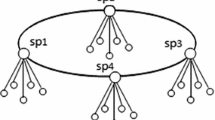Abstract
Peer-to-Peer data structures (P2P data structures) let a large number of anonymous peers share the data-management workload. A common assumption behind such systems is that peers behave cooperatively. But as with many distributed systems where participation is voluntary, and the participants are not clearly observable, unreliable behavior is the dominant strategy. This calls for reputation systems that help peers choose reliable peers to interact with. However, if peers exchange feedback on experiences with other peers, spoof feedback becomes possible, compromising the reputation system. In this paper we propose and evaluate measures against spoof feedback in P2P data structures. While others have investigated mechanisms for truthtelling recently, we are not aware of any studies in P2P environments. The problem is more difficult in our context because detecting unreliable peers is more difficult as well. On the other hand, a peer can observe the utility of feedback obtained from other peers, and our approach takes advantage of this. To assess the effectiveness of our approach, we have conducted extensive analytical and experimental evaluations. As a result, truthful feedback tends to have a much higher weight than spoof feedback, and collaboration attacks are difficult to carry out under our approach.
An erratum to this chapter can be found at http://dx.doi.org/10.1007/11914853_71.
Preview
Unable to display preview. Download preview PDF.
Similar content being viewed by others
References
Resnick, P., Kuwabara, K., Zeckhauser, R., Friedman, E.: Reputation Systems. Communications of the ACM (CACM) 43 (2000)
Khopkar, T., Li, X., Resnick, P.: Self-Selection, Slipping, Salvaging, Slacking, and Stoning: The Impacts of Negative Feedback at eBay. In: Proceedings of the 6th ACM Conference on Electronic Commerce (EC 2005), pp. 223–231 (2005)
Jurca, R., Faltings, B.: “CONFESS”. Eliciting Honest Feedback Without Independent Verification Authorities. In: Faratin, P., Rodríguez-Aguilar, J.-A. (eds.) AMEC 2004. LNCS, vol. 3435, pp. 59–72. Springer, Heidelberg (2006)
Miller, N., Resnick, P., Zeckhauser, R.: Eliciting Informative Feedback: The Peer Prediction Method. Management Science 51, 1359–1373 (2005)
Prelec, D.: A Bayesian Truth Serum for Subjective Data. Science 306, 462–466 (2004)
Gummadi, K., Gummadi, R., Gribble, S.D., Ratnasamy, S., Shenker, S., Stoica, I.: The Impact of DHT Routing Geometry on Resilience and Proximity. In: Proceedings of the ACM Conference on Applications, Technologies, Architectures, and Protocols for Computer Communication (SIGCOMM 2003) (2003)
Ratnasamy, S., Francis, P., Handley, M., Karp, R., Shenker, S.: A Scalable Content-Addressable Network. In: Proceedings of the ACM Conference on Applications, Technologies, Architectures, and Protocols for Computer Communication (SIGCOMM 2001) (2001)
Aberer, K.: P-Grid: A Self-Organizing Access Structure for P2P Information Systems. In: Batini, C., Giunchiglia, F., Giorgini, P., Mecella, M. (eds.) CoopIS 2001. LNCS, vol. 2172, pp. 179–194. Springer, Heidelberg (2001)
Malkhi, D., Naor, M., Ratajczak, D.: Viceroy: A Scalable and Dynamic Emulation of the Butterfly. In: Proceedings of the 21th ACM Symposium on Principles of Distributed Computing (PODC 2002), pp. 183–192 (2002)
Stoica, I., Morris, R., Liben-Nowell, D., Karger, D.R., Kaashoek, M.F., Dabek, F., Balakrishnan, H.: Chord: A Scalable Peer-To-Peer Lookup Service for Internet Applications. In: Proceedings of the ACM Conference on Applications, Technologies, Architectures, and Protocols for Computer Communication (SIGCOMM 2001) (2001)
Böhm, K., Buchmann, E.: Free Riding-Aware Forwarding in Content-Addressable Networks. International Journal on Very Large Data Bases (VLDB) (2006)
Back, A.: Hashcash - A Denial of Service Counter-Measure (2002), http://hashcash.org
Jakobsson, M., Juels, A.: Proofs of Work and Bread Pudding Protocols. In: Proceedings of the 4th International Conference on Communications and Multimedia Security (CMS 1999) (1999)
Dewan, P., Dasgupta, P.: Securing P2P Networks Using Peer Reputations: Is There a Silver Bullet? In: Proceedings of the 2nd IEEE Consumer Communications and Networking Conference (CCNC 2005) (2005)
Aberer, K., Despotovic, Z.: Managing Trust in a Peer-2-Peer Information System. In: Proceedings of the 10th International Conference on Information and Knowledge Management (CIKM 2001) (2001)
Garcia-Molina, H., Schlosser, M.T., Kamvar, S.D.: The EigenTrust Algorithm for Reputation Management in P2P Networks. In: Proceedings of the 12th International World Wide Web Conference (WWW 2003) (2003)
Xiong, L., Liu, L.: PeerTrust: Supporting Reputation-Based Trust for Peer-to-Peer Electronic Communities. IEEE Transactions on Knowledge and Data Engineering (TKDE) 16 (2004)
Prelec, D., Weaver, R.G.: Truthful Answers are Surprisingly Common:Experimental Tests of the Bayesian Truth Serum. In: Proceedings of the Conference on Econometrics and Experimental Economics (CEEE 2006) (2006)
Cornelli, F., Damiani, E., di Vimercati, S.D.C., Paraboschi, S., Samarati, P.: Choosing Reputable Servents in a P2P Network. In: Proceedings of the 11th International World Wide Web Conference (WWW 2002), pp. 376–386 (2002)
Author information
Authors and Affiliations
Editor information
Editors and Affiliations
Rights and permissions
Copyright information
© 2006 Springer-Verlag Berlin Heidelberg
About this paper
Cite this paper
Buchmann, E., Böhm, K., von der Weth, C. (2006). Towards Truthful Feedback in P2P Data Structures. In: Meersman, R., Tari, Z. (eds) On the Move to Meaningful Internet Systems 2006: CoopIS, DOA, GADA, and ODBASE. OTM 2006. Lecture Notes in Computer Science, vol 4275. Springer, Berlin, Heidelberg. https://doi.org/10.1007/11914853_30
Download citation
DOI: https://doi.org/10.1007/11914853_30
Publisher Name: Springer, Berlin, Heidelberg
Print ISBN: 978-3-540-48287-1
Online ISBN: 978-3-540-48289-5
eBook Packages: Computer ScienceComputer Science (R0)




